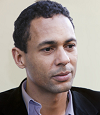Wayne Jordash QC
 I met Wayne Jordash in Doughty Street Chambers, where he was paying a flying visit, having recently returned from one of the international courts where he specialises in criminal and human rights law. After our meeting, however, Wayne was off for a much needed holiday, after a short visit to his parents in the North-East of England. Whilst at comprehensive school, Wayne – who is of mixed Caribbean and English heritage – had originally planned to become a social worker, and he studied psychology at university. However, after returning from a seven months “gap” in Japan following graduation, Wayne had decided that his long-term career aim would be to work for the United Nations. To that end, the Bar seemed to be the natural route and Wayne undertook a conversion course in law before working for a year as a legal assistant at Clifford Chance, as a precursor to doing pupillage. He worked in a variety of part-time and vacation jobs, including in a shop in Peckham, a bookmakers and a factory, to pay his Bar School fees.
I met Wayne Jordash in Doughty Street Chambers, where he was paying a flying visit, having recently returned from one of the international courts where he specialises in criminal and human rights law. After our meeting, however, Wayne was off for a much needed holiday, after a short visit to his parents in the North-East of England. Whilst at comprehensive school, Wayne – who is of mixed Caribbean and English heritage – had originally planned to become a social worker, and he studied psychology at university. However, after returning from a seven months “gap” in Japan following graduation, Wayne had decided that his long-term career aim would be to work for the United Nations. To that end, the Bar seemed to be the natural route and Wayne undertook a conversion course in law before working for a year as a legal assistant at Clifford Chance, as a precursor to doing pupillage. He worked in a variety of part-time and vacation jobs, including in a shop in Peckham, a bookmakers and a factory, to pay his Bar School fees.
Called to the Bar in 1995, Wayne originally worked in criminal defence work, branching out to domestic human rights where he was keen “to advance and contribute to the rights of young black men”. After five years, Wayne took the decision to move into international criminal trials work (“rudimentary at best, 20 years ago”), later moving into the field of international human rights (including “trying to get international corporations to better respect human rights”). He found the work extremely satisfying, doing something to try and effect positive change. Wayne said that it was essential that as a lawyer you went into court really caring about the law as well as doing the best for the client.
Wayne added that “you rarely end up where you originally wanted to be,” as these days he said he in some senses “worked against the UN”, meaning working to get his clients acquitted. Currently, Wayne is acting for the Libyan government at the International Criminal Court; for the Serbian Government at the International Court of Justice; and for the Serbian government’s ex-Chief of State Security at the International Criminal Tribunal for the former Yugoslavia and Rwanda. Wayne has also provided specialist advice to Human Rights Watch (on qualified privilege for human rights workers); to the International Commission of Jurists (on the prospects of prosecuting a sitting head of state for alleged crimes against humanity); and to the principal defender at the Extraordinary Chambers in the Courts of Cambodia (advising on a range of international law issues relevant to the defence of former Khmer Rouge members of the Pol Pot regime). He said “you do interesting things and find other interesting things along the way”. For example, more recently, Wayne was appointed as the key expert in the Council of Europe’s Business and Human Rights program for legal professionals.
It was only in recent years that Wayne had thought about applying to become a QC. Prior to that, he had been slightly doubtful as to whether the ‘badge’ of QC would suit him as an advocate and as a person, given the lingering sense that silk was “not for people like me”. However, after a number of colleagues suggested he should apply for QC, Wayne studied the QC process (based on evidence and competencies) and was pleasantly surprised that it looked like something he could and should aspire to; he said that he was impressed at just how far the QC Selection Panel was willing to “look outside the norm – or, rather, at what was perceived as the norm”.
Wayne had spent “a good deal of time” seeing just how his practice fitted against the competencies. He concluded that he appeared to tick all the boxes, except perhaps for the fact that he could not list 12 judicial assessors in the two-year period, because his cases tended to be large, complex and very lengthy. Accordingly, Wayne had to go back more than three years to gather seven or eight judicial assessors in cases of substance, sensitivity and so forth. He considered it appropriate to seek outside expert help with the interview and the form; commenting that many applicants would be unfamiliar with interviews and would not be at ease at talking about themselves (rather than about their clients). It was important that the interview should not feel alien. However, he did not consider there was much value in being given ‘suggested answers’ to interview questions, as that would strike a false note.
You had to be able to speak authentically about your own experience, Wayne said. This was true of all the competencies, including diversity. He was delighted that diversity figured equally alongside the other competencies. You needed to think carefully about the things you had done to advance diversity, even more so perhaps when diversity was something you ‘lived and breathed’. You had to sit down and think about what you actually did. In his case he was able to draw on his 30% International pro-bono work and the steps that he had taken to assist in creating opportunities for bright black, female and working class students to get into the profession at various levels. It was important that the Bar continued to be opened up to less privileged youngsters. But there were also the smaller things that were important, like taking time out with junior staff whose backgrounds meant the ways things were done in chambers could seem strange.
As for those contemplating applying for silk, Wayne said that the 64-page application form was potentially overwhelming, and it was essential to allow yourself sufficient time to complete it properly. It was a long, taxing and expensive process overall and one you should not embark upon lightly. He had not particularly designed and built his practice to ‘fit’ silk, but he had to be confident that he did indeed ‘fit’ without having to try and ‘shoe-horn’ his practice into the criteria for appointment. Even though he hoped that he was not overly anxious about achieving the QC badge on his first attempt, it was still a long wait to get the result.
As to balancing work and life demands, Wayne agreed that this was a difficult thing to achieve. He said that he had had to make non-work sacrifices over the past 15 years in order to achieve what he had – which, he emphasised, he gained enormous satisfaction from. The “nicest things about being made a silk” included the opportunity to have the choice to slow down a little bit with the workload, to compete more easily in the international market and to enjoy a greater sense of security. Being a QC definitely opened doors, and it was a real privilege to be awarded silk, Wayne concluded.
© Queen’s Counsel Appointments Ltd
- Date: March 25, 2019
- Category: QCA Profiles 2014

